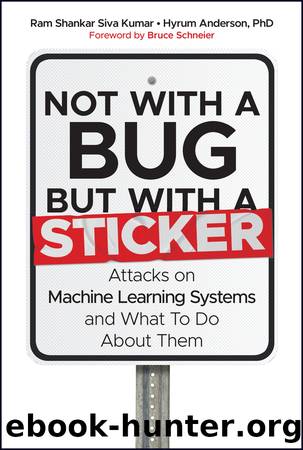Not with a Bug, But with a Sticker by Ram Shankar Siva Kumar & Hyrum Anderson

Author:Ram Shankar Siva Kumar & Hyrum Anderson [Ram Shankar Siva Kumar & Anderson, Hyrum]
Language: eng
Format: epub
ISBN: 9781119883999
Publisher: Wiley
Published: 2023-05-02T00:00:00+00:00
Poisoning the Well
Chances are you've had a rough day if you ever email your kids and say, âI'll be coming back home, and I will talk to you and Mom, and if you're interested, I'll explain more details.â
On February 1, 2011, then Corporate Vice President of Microsoft Search, Harry Shum, was wrapping up his day at work when news broke that Google had accused Microsoft Search of plagiarizing Google's search results. Microsoft's Search engine, Bing, was downright cheating by copying Google's search results, Google's team accused. And in a âwe've got the receiptsâ moment, Google added it had irrefutable proof of Microsoft's cheating.
Mortified by the allegations, Shum ordered a deep dive into the situation. There was a whirlwind of PR, legal, and technical layers to peel. Owing to his high-profile position leading Microsoft's search engine, Shum saw the company's embarrassment as his own. A scandal! So, among the flurry of emails Shum dispatched to his deputies, he also emailed his son, reassuring him that he and Bing were in the right.
What came next was nothing short of dramatic. Microsoft vigorously denied the allegation. Google denied the denial. From the Wall Street Journal to the BBC, the story was plastered in the media and even appeared in the monologues of late-night TV hosts Jimmy Fallon and Stephen Colbert.
When Microsoft rebranded its search efforts to Bing in 2009 to capitalize on the billion-dollar ad search market, it was already behind the curve. Google dominated the market with a 60 percent market share, and Yahoo search maintained a strong second position with 20 percent. Microsoft was a distant third, but its search had begun to gain traction and was growing fast.
Google, like any competitor, kept tabs on Bing Search. In a comparative analysis, Google noticed that sometimes Bing's top results would mirror its own. Google search engineers suspected something insidious was happening in Bing and Internet Explorer's toolbars. So, in October 2010, Google devised an unprecedented sting operation against Microsoft's Bing.
Until that time, Google had never wantonly associated a search term with a specific site. Search listings were determined algorithmically, and Google took a hands-off approach. But when engineers suspected Microsoft of copying its search results, Google's leaders decided to break their cardinal rule just this once.
Google engineers hatched a plot to trace the flow of information from Google to Bing. They created fictitious and obviously random search words and associated them with specific websites in Google Search. For instance, the word hiybbprqag was manually associated with the Wiltern Theater in Los Angeles. Had you Googled hiybbprqag in October 2010, you would have been directed to the Wiltern seating arrangement. The same search in Bing would have returned no results. The poison pill was kept secretâno one outside of these Google engineers knew that hiybbprqag was mapped to a theater. Similarly, the random keyword juegosdeben1ogrande was secretly linked to a hip-hop bling store. In all, Google created 100 such âhoneypotâ words and lay in wait to catch Microsoft's hand in the jarâthe âBing
Download
This site does not store any files on its server. We only index and link to content provided by other sites. Please contact the content providers to delete copyright contents if any and email us, we'll remove relevant links or contents immediately.
| Ada | Ajax |
| Assembly Language Programming | Borland Delphi |
| C & C++ | C# |
| CSS | Compiler Design |
| Compilers | DHTML |
| Debugging | Delphi |
| Fortran | Java |
| Lisp | Perl |
| Prolog | Python |
| RPG | Ruby |
| Swift | Visual Basic |
| XHTML | XML |
| XSL |
Hello! Python by Anthony Briggs(9397)
OCA Java SE 8 Programmer I Certification Guide by Mala Gupta(9360)
The Mikado Method by Ola Ellnestam Daniel Brolund(9325)
Algorithms of the Intelligent Web by Haralambos Marmanis;Dmitry Babenko(7870)
Sass and Compass in Action by Wynn Netherland Nathan Weizenbaum Chris Eppstein Brandon Mathis(7414)
Test-Driven iOS Development with Swift 4 by Dominik Hauser(7360)
Grails in Action by Glen Smith Peter Ledbrook(7311)
The Well-Grounded Java Developer by Benjamin J. Evans Martijn Verburg(7137)
Secrets of the JavaScript Ninja by John Resig Bear Bibeault(5975)
Kotlin in Action by Dmitry Jemerov(4660)
Hands-On Full-Stack Web Development with GraphQL and React by Sebastian Grebe(3927)
Functional Programming in JavaScript by Mantyla Dan(3729)
Learning Java by Patrick Niemeyer & Daniel Leuck(2877)
Mastering Python for Finance by Weiming James Ma;(2854)
Learning React: Functional Web Development with React and Redux by Banks Alex & Porcello Eve(2849)
Windows APT Warfare by Sheng-Hao Ma(2809)
WordPress Plugin Development Cookbook by Yannick Lefebvre(2629)
Mastering Java 9 by Dr. Edward Lavieri(2577)
Architecting Modern Java EE Applications: Designing lightweight, business-oriented enterprise applications in the age of cloud, containers, and Java EE 8 by Daschner Sebastian(2566)
